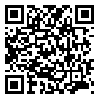BibTeX | RIS | EndNote | Medlars | ProCite | Reference Manager | RefWorks
Send citation to:
URL: http://tumj.tums.ac.ir/article-1-993-en.html
Background and Aim: Anxiety is the most common psychological distress in cancer patients. Many studies have been conducted to assess the prevalence of anxiety and depression and the predisposing factors of psychological morbidity in cancr patients. Patients knowledge of disease, their desire for more information, their satisfaction of given information and their attitudes’ towards communication of information about cancer are among issues that have not been well anddressed in assessment of psychological morbidity of cancer patients in Iran.
Materials and Methods: 250 cancer patients of 15-75 age group who were referred to Cancer Institute entered the study. The patients’ knowledge of disease, their desire for more information, their attitude and satisfaction were assessed by Questionnaire n1. patients’ anxiety and depression scores were assessed by Hospital Anxiety and Depression Scale (HADS).
Results: 30 of patients had severe anxiety symptoms and 17% suffered severe depression most patients’ knowledge of disease was “low” (32%) and “intermediate” (54%). There was no significant correlation between knowledge and anxiety and depression. Most patients (69%) believed that the information given by physicians had been “insufficient”. Depression score was significantly higher in this group of patients compared to other patients. Most patients (59%) had a high level of desire for gaining more information and 64% believed that physicians should inform patients of different aspects of disease as much as possible. There was no significant correlation between patients’ desire and attitude and anxiety and depression. Level of satisfaction was “low” in 29% of patients and “intermediate” in 39%. Depression and anxiety scores were significantly higher in patients who were less satisfied with given information.
Conclusion: Low level of knowledge in most cancer patients, their high desire for gaining more information, their dissatisfaction of given information and their positive attitudes towards full disclosure of information about cancer in this study, all indicate that complete and honest disclosure of information to cancer patients by physicians should be improved and encouraged. Although it seems that amount of information given doesn’t influence the psychological morbidity in cancer patients the patients’ satisfaction of given information, which has implications for the quality of patient-physician communication, plays a far more important role in occurance of psychological morbidity in cancer patients. Meanwhile, negative public opinion of cancer and its prognosis greatly influences the physicians functions and the quality of communication process, and also has negative effects on cancer patients’ psychological adjustment.
| Rights and permissions | |
 |
This work is licensed under a Creative Commons Attribution-NonCommercial 4.0 International License. |





